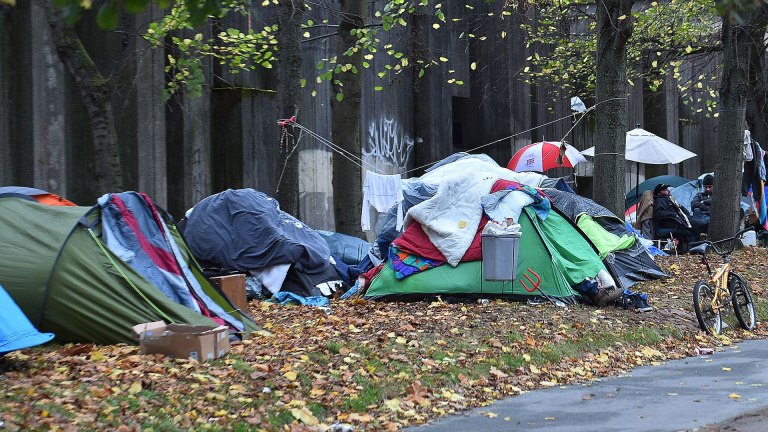Indeed, with its honey-coloured stone crescents and lush green surrounds, the city still looks much as it did when the author lived here.
But behind the carefully preserved Georgian beauty, Bath is facing a crisis.
The spa town has one of the worst housing shortages in the country. Property prices have soared by more than 70% in the past decade, and in some areas the average home now costs 18 times the average salary. Tenants, meanwhile, can expect to spend around 40% of their income on rent.
Read more:
The problem is simple but “insurmountable”, says Matthew McCabe, councillor and housing lead for the Liberal Democrat-led council. Bath’s UNESCO World Heritage listing – which protects not just its Georgian crescents but also 18 key views and the surrounding green landscape – severely limits where and how the city can expand. Building upwards or outwards is effectively off the table.
“It is very, very hard – nearly impossible – for us to build at scale in Bath,” McCabe tells Big Issue. “It’s a bit of an insurmountable issue.”
Advertising helps fund Big Issue’s mission to end poverty
More than 6,000 people are on the city’s housing waitlist, with at least 500 in crisis.
“We’re building maybe 20 [social housing units] a year. Somehow, we need to ramp up our build tenfold, if we’re ever to get on top of the 500 people who are in crisis each year.”
Earlier this year, Graham Sabourn, the council’s head of housing, told a council scrutiny panel that families hoping for a four-bed home from the council could reasonably find themselves “waiting around 200 years”. By then, the great-great grandchildren of the original applicants might be donning bonnets for Austen’s 450th anniversary.
A heritage conundrum
For McCabe, the World Heritage designation has become a double-edged sword: While it brings in billions of pounds in tourism spend, “it’s a bit of a noose around our neck.”
“We are just out of sites,” he continues.
“The green setting and protected views are something special in terms of outstanding universal value, but you cannot strangle a city if you want the city to live and thrive, and if we can’t expand the city, then we’re in trouble. And that’s what we are seeing right now.”
Advertising helps fund Big Issue’s mission to end poverty
But “It’s not just UNESCO”, cautions Harry Charrington, professor of architecture at the University of Westminster. He was previously the director of studies for the architecture master’s degree at the University of Bath.
“The whole way we protect heritage in Britain creates rigidity. In Bath, an entire terrace is treated as a single listed object. You can’t even upgrade the back of a building, even though those rear walls were originally rubble. When I lived there I wasn’t allowed to install secondary glazing because someone on the street might see it. The result is freezing homes and very little flexibility to adapt or convert buildings.”
Bath’s beauty is not just a planning headache, of course – it is a recognition of global cultural significance, placing it alongside world icons such as the Great Wall of China or Venice’s canals.
A spokesperson for UNESCO said that the “stunning” sites and projects “celebrate the UK’s national story, adding an estimated £150 million a year to the UK economy, while championing the history of local communities”.
No one wants to knock down Bath’s Georgian crescents and turn them into huge tower blocks of flats, says McCabe. But the city’s heritage protections undeniably create practical limits on development.
Although UNESCO status carries no legal force, it is enshrined the Bath and North East Somerset Local Plan. Its significance is given great weight in planning decisions. For example, in 2021, a proposal for 15 affordable homes at Deadmill Lane was rejected after inspectors ruled it would erode the city’s green setting and harm its World Heritage value.
Advertising helps fund Big Issue’s mission to end poverty
Bath’s only homelessness hostel is itself under threat. Julian House, on Manvers Street, must leave its site by summer 2026 – and if a new location can’t be secured, the city could lose its only dedicated emergency accommodation.
“The flip side of Bath’s beautiful surroundings is that it is very difficult and expensive to develop new housing,” says Sophie Barry, from Julian House.
The hostel has already scouted several possible sites, but each comes with “a high development cost and/or limitations on the number of people [we] can support, due to planning regulations”.
The shortage of affordable homes, Barry adds, is creating a “bottleneck” in crisis accommodation. “Move-on accommodation for clients who are ready to leave our services is becoming increasingly difficult to secure. There simply aren’t enough affordable properties in the area.”
Could Bath ever escape its heritage straitjacket? Not really, says McCabe. Hindsight is, as ever, a wonderful thing.
“If I could wave a magic wand, I’d go back to 1987, when they drew up the [UNESCO] listing, and I would insert the words, ‘The city will expand along its sustainable transport corridors.’”
Advertising helps fund Big Issue’s mission to end poverty
Bath is unusual in being double listed. It first gained World Heritage status in 1987 for its Georgian architecture and Roman archaeology, then in 2021 became part of the transnational Great Spa Towns of Europe inscription. That second listing ties Bath to ten other spa cities across the continent.
Amending the wording would mean delisting Bath altogether – and because the 2021 recognition is communal, it would also strip status from the other European spa towns.
“There is no appetite from government to tell a whole load of other countries in Europe, that we’re going to delist all your great spa towns whilst Bath sorts itself out,” McCabe says. “There’s no appetite for that.”
The short term letting crisis
The heritage constraints are only part of Bath’s housing puzzle.
Even if Bath delisted, professor Charrington says, the problems wouldn’t magically resolve themselves.
“People talk as if losing UNESCO status would solve everything, but I doubt it,” he says. “Even without World Heritage listing, Bath would still face conservation areas, listed buildings, and the same market forces driving up prices. The pressures on housing wouldn’t magically disappear.”
Advertising helps fund Big Issue’s mission to end poverty
“The real issue is that we simply don’t fund enough genuinely affordable housing. Even if you opened up more land, if the system is market-led you’ll still get mostly housing for profit, not for the people who need it.”
A growing number of homes are also vanishing into the short-term rental market. In 2023, the region counted more than 1,000 Airbnb and similar listings.
“Airbnb and short-term letting is very lucrative for property owners,” McCabe says. “The tourist impact on the city doesn’t have to rob local people of somewhere to live. But increasingly it does, because this isn’t about people renting out a spare room, this is about whole houses being lost to the housing market.”
The squeeze extends even to new developments. A recent case is a “prime example”, McCabe says. In 2021, an office block on Cumberland Row was approved for four residential flats. It was immediately snapped up by Bristol-based company Bespoke Cultural Escapes, which converted it into seven one-bed units – none of which entered the housing market.
“We just had an apartment block in Bath, previously an office block,” McCabe says. “It got permission for residential. And then bang, once it’s been built, the property sells to an Airbnb company out of Bristol. And not a single one of those properties has come on the residential housing market, not one. And this is legal, no one’s broken any rules.”
The Big Issue approached Bespoke Cultural Stays for comment.
Advertising helps fund Big Issue’s mission to end poverty
Airbnb disputes claims that holiday lets are driving Bath’s housing crisis. “Airbnb has no significant impact on the availability or affordability of homes in the vast majority of communities, and entire-home Airbnb listings rented 90 nights or more make up just 0.6% of Bath’s housing stock,” said Carl Thomson, Public Policy Manager for Airbnb in the UK.
Yet in a city where every home counts, that 0.6% represents hundreds of properties – potentially enough to house many of those 500 people McCabe describes as being in crisis.
The council needs new planning controls to stop this trend, the councillor argues.
“You (the government) need to give us a planning use class so that every short-term letting has its own use class, because then we can use the planning system to decide where short-term letting goes and where it can’t go,” he says. “We need the power to say no, we don’t want short-term letting in this particular area because we have a more urgent residential crisis that we’re trying to solve.”
Councillors insist their hands are tied by UNESCO rules and by developers chasing quick profits from holiday lets.
The festival-goers will continue to arrive each September, rightfully delighting in the city’s beauty.
Advertising helps fund Big Issue’s mission to end poverty
But unless Bath can find a way to fix its housing crisis and free up affordable homes, those costumed visitors may find themselves wandering through little more than a museum backdrop – a city preserved in amber while its residents are priced out.
Do you have a story to tell or opinions to share about this? Get in touch and tell us more.
Reader-funded since 1991 – Big Issue brings you trustworthy journalism that drives real change.
Every day, our journalists dig deeper, speaking up for those society overlooks.
Could you help us keep doing this vital work? Support our journalism from £5 a month.





